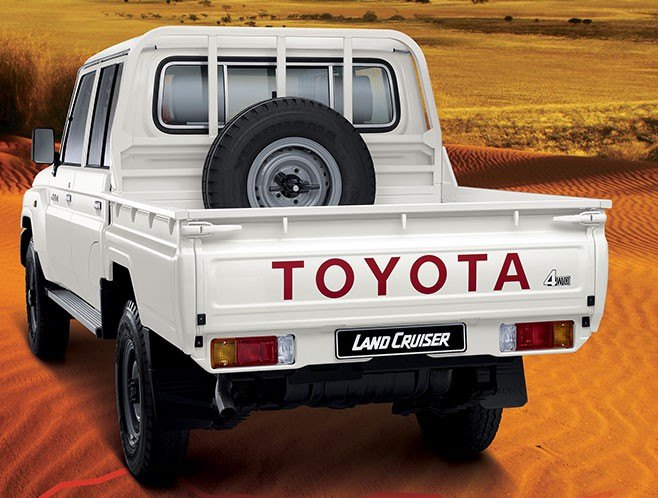Toyota Looking To Conquer Africa
Though Toyota already has a presence in South Africa, the automaker is eyeing the last untapped market in the world: The African continent.
Automotive News reports Toyota patriarch Shochiro Toyoda gave his son, current president Akio Toyoda, a mission last year to explore markets outside of the “Asia-Europe-America” sphere, especially those where the younger Toyoda had not visited. His travels took him to a knockdown factory in Kenya, where there are 40 cars per 1,000 people according to IHS Automotive, laying the early groundwork for an all-out campaign to get as much of the final frontier as possible.
Success in the market may have to come in the long term, however; IHS predicts GDP per capita in Sub-Saharan Africa won’t reach the threshold of $3,000, as well as the ownership rate of 70 units per 1,000 people, until 2030 at the earliest. Toyota Africa CEO Johan van Zyl, who is scouting for new factory locations outside of South Africa, knows this reality well:
It’s a growing market, a market with a future. We have quite an ambitious [annual sales] target. But we must also understand, this is not going to happen overnight. We have to put the right things in place. And that is what we are busy doing, to ensure that we have the right foundation for the business in the future in Africa.
In the meantime, the automaker will launch the Quest compact in South Africa next month. The Quest — based upon the previous-gen Corolla — will help boost production towards full capacity at Toyota’s Durban plant; while max capacity is 220,000 annually, current production is 160,000 units per year. Unlike many auto makers, Toyota is not pursuing a new brand or platform for their new, low-cost car.
Seattle-based writer, blogger, and photographer for many a publication. Born in Louisville. Raised in Kansas. Where I lay my head is home.
More by Cameron Aubernon


































Comments
Join the conversation
Toyota already conquered the African market: just about every "Technical" or troop carrier is a 70 series Land Cruiser or the ubiquitous HiLux. Corollas are just about everywhere, as well as the vans doing yeomans' work with people transport both inter and intra city. There is demand for quality vehicles in developing economies, albeit limited and somewhat specialized.
@Pch101, DiM, the laine, RobertRyan and any other interested reader, The information provided by Pch101 is tainted and untrue. Pch101 and DiM do have a tendency to water down, fabricate and provide untruths when they think the US is uncompetitive. American Exceptionalism. The US receives the Mitsubishi Canter in 4x4 and with the 3 litre Fiat designed diesel. In the US this vehicle costs $55 000USD or $58 500AUD. The same vehicle in Australia is $55 000AUD. So it is in fact cheaper in Australia. I do see this V8 Landcruiser costing roughly the same in the US as we pay in Australia. This is the cost of a quality purpose built vehicle. I conclude my comment with the fact that similar vehicle that we have in Australia similar to this Toyota Landcruiser will cost the same in the US. If it is sold for less in the US, it will be as usual a downgraded and Americanised version, which will compromise it's capabilities.
@Marcelo de Vasconcellos and Niky, This might be an interesting read. I will read this. I don't know it's content. http://www.people.fas.harvard.edu/~jidoming/images/jid_explaining.pdf
@u mad scientist > ;) US brands tend to do poorly overseas due to poor market recognition, given similar cars sell well under Opel/Vaxhall/etc. China is ironically the exception in context of our chat above. US brands are highly recognised overseas. It's just the US manufacturers have put in a piss poor effort into globalising. Over the last decade Detroit is attempting to be global players. The most profitable global manufacturers started globalising well before the US made attempts. VW, Toyota and other Japanese manufacturers started looking into this in the 50s. Or I should say te model Detroit adopted for globalization was inferior, ie, regional models. Because that's how it did business in the past. Very short sighted approach by Detroit in hind sight. The US tried to combat the influx of overseas imports with the chicken tax and DoT was brought into existence in 67. The US manufacturers did manufacture globally but with regional products. Ford has learnt and has the Ford One (loosely), GM is still a little behind the 8 ball and Chrysler was never a real global player due to it's continual bouts of debt exposure which in turn didn't allow it to expand globally. The US is now playing catch up. This is evident by how closely the US is now working with all of the CAPS regarding vehicle safety. The only area the US really needs to get a handle on vehicle design is CAFE and other divergent regulations. Eventually the US will adopt harmonized vehicle standards which will match it's competitors. It has to for it's very existence into the future. The US is moving away from the Galapagos Islands effect, except with it commercial vehicles. But this will change within a couple of decades.